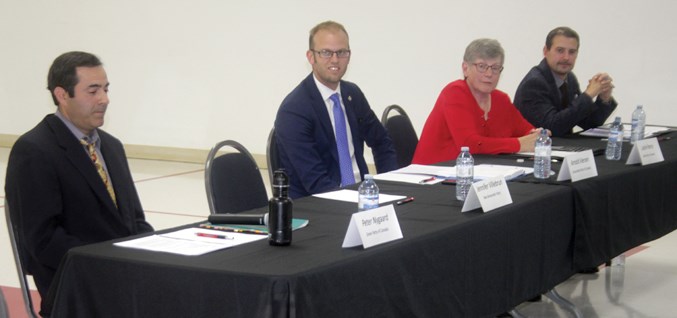Roughly 200 residents turned out to learn more about the candidates in the Peace River-Westlock riding during the all-candidates forum Oct. 2 at the Barrhead Senior’s Drop-in Centre.
The event was attended by Conservative Party of Canada candidate Arnold Viersen, Liberal Party of Canada candidate Leslie Penny, Green Party candidate Peter Nygaard and People’s Party of Canada candidate John Schrader. Jennifer Villebrun, the NDP candidate, was unable to attend.
Over the two-hour event, residents heard candidates positions on a variety of topics including rural crime and drugs, agriculture and what can be done to help farmers after another poor year, seniors housing and healthcare, support for pipelines, Indigenous issues, Western alienation and the possibilities of a minority government.
Canadians head to the polls Oct. 21.
While introducing themselves and sharing some of their background, each was asked what they saw as the main issue facing Canadians.
Referencing the Climate Strike protests Sept. 20 and 27, Nygaard said the most important issue is climate change.
“Canada is not a very populous country. When a million people take to the streets, the government should recognize what these people are saying, and what they said is they want climate action,” said Nygaard.
The Green Party has advocated reaching net zero CO2 emissions by 2050, which will be achieved by a transition to renewable energy and the establishment of a national electricity grid to transfer renewable energy across the country, as well as a national program of retrofitting buildings to be energy efficient.
If elected Nygaard said he would help assure income protection and assistance for oil and gas workers as Canada shifts to a more green economy.
“We want a stable economy. We want people working. This is how as an MP I would address this issue.”
Viersen, who is the incumbent MP, said this election demonstrates a stark contrast between the various parties.
“We have, on the one hand, parties that are very much concerned with their global perspective, and the other hand, we have a party that is prepared to stand up for the Canadian way of life,” he said.
He also highlighted the stark contrast between Prime Minister Justin Trudeau and CPC leader Andrew Scheer, noting the former was “raised in the halls of power” and the other was raised in social housing.
“That is probably the biggest question facing us in this election: what kind of country do we want to be, and how do we want to pay for everything?”
Viersen then reiterated the CPC’s promise to repeal the federal carbon tax immediately and added a promise that his party wished to also remove the GST from heating bills.
Penny, who is a Town of Barrhead councillor, said it is challenging to come up with a single “crisis point”, but one issue she feels that doesn’t get a lot of attention is the viability of small communities.
One of the threats to small-town viability is the lack of medical practitioners, referencing the impending closure of the Barrhead Medical Clinic and the loss of two more physicians on top of the three that left this summer.
Noting that small towns also have difficulties finding speech language therapists, Penny said the federal government has some tools that can help bring these professionals into small communities.
Penny also mentioned how many students are unable to enter a profession because they don’t have the marks to enter a particular faculty or because the costs are too high. The federal government not only looks after student loans but also has grants that can assist students.
Finally, she mentioned the need to integrate more value added-products into agriculture “so we are not just shipping resources, but we are shipping products made from our resources.
Schrader, who is from Westlock County, said the most pressing issue for Canada is investor confidence.
“The way the PPC is going to tackle that is comprehensive. We’re going to balance the federal budget within two years and we’re the only party that’s interested in doing that within one term,” he said.
Schrader said the PPC would also stop damaging investor confidence with “environmental fear-mongering,” noting that the party will reduce regulation and introduce “results-based, measurable environmental standards.”
He also mentioned that the PPC will lower corporate taxes and farm taxes to 10 per cent while eliminating the capital gains tax.
As well, the PPC will also level the playing field for all free market competition and mandate the Bank of Canada to stop devaluing the Canadian dollar.
De-regulation and lower taxes will come a cost, however: Schrader said the PPC will eliminate corporate welfare completely, noting how Canadians spend $29 billion on various business subsidies.



